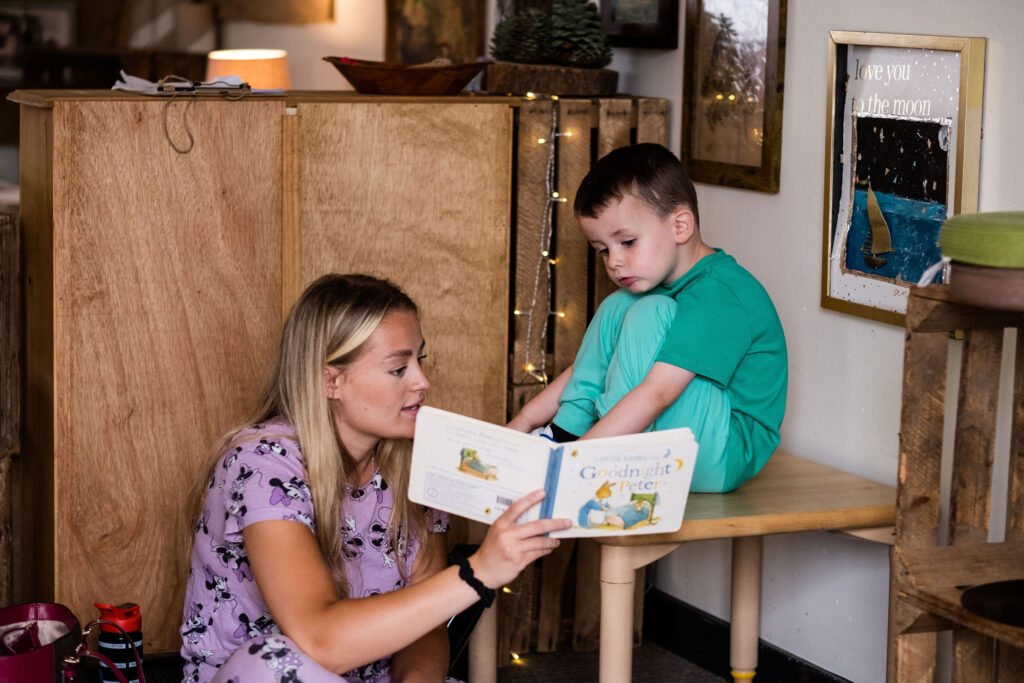Drawing on data from 30 qualitative interviews, a workforce survey, internal evaluations and a parent survey, the report evaluates progress against our theory of change. We are delighted that the report shows that we are helping create a more effective early years support in Stoke-on-Trent and have laid a strong foundation to enable continued system-wide change. Early evaluation findings suggest promising outcomes in system three key areas in particular: collaboration, parental engagement, and school readiness. Download the report here
Stoke-on-Trent: a city in need
Stoke-on-Trent faces significant socio-economic challenges that hinder early childhood outcomes. Disparities are particularly stark among children eligible for free school meals, with only 59.2% reaching GLD compared with 68.4% of their non-eligible peers. Thrive at Five is operating in Abbey Hulton and Bentilee wards – two areas marked by high deprivation, fragmented services, and parental isolation.
Implementation insights
Thrive at Five has established itself as a valued initiative within Stoke-on-Trent’s early years landscape. There is a clear sense that this approach came at the right time, and the area’s readiness was strikingly described in terms of the high level of need rather than by reference to existing foundations from which to build on.
Despite being up against systemic challenges, Thrive at Five appears well adopted by the local system. It is seen as highly acceptable by professionals at all levels and parts of the system, and those interviewed say they would strongly recommend it to other local authorities. Stakeholders commended its inclusive, co-designed approach, and the credibility of its local backbone team and national leaders. Key facilitating factors also include its local adaptation, with the discovery phase ensuring alignment with Stoke-on-Trent’s specific needs and assets. Other facilitators include high levels of community trust. Thrive at Five’s collaborative ethos resonated with stakeholders, fostering buy-in and momentum, and there is a strong sense of its presence in the local community.

Stronger systems and practices
Interviews with system leaders and practitioners described Thrive at Five as playing a catalytic role in improving collaboration across services. System leaders and practitioners report better partnership working and deeper engagement with parents and communities. Some interviewees report stronger collaboration in the Thrive at Five wards compared to other areas and there is tentative evidence to support this viewpoint from the workforce survey, with more positive responses to collaborative working reported by practitioners working in the Thrive at Five wards. Thrive at Five has also elevated awareness of the importance of the early years, expanded training opportunities (e.g., NELI training), and increased data-driven decision-making.
Empowered parents
Parents who engage with Thrive at Five activities, particularly the parent, baby and toddler (PBT) groups, report significant improvements in their confidence, wellbeing, and ability to support their children’s learning and development at home. Many describe feeling less isolated and more connected to others in their communities. They also described benefits to their own confidence and social skills and improvements in mental health and wellbeing.
Parent Connectors have been especially effective in reaching families who might not otherwise access services. Professionals consistently highlighted the energy, commitment, and authenticity that Parent Connectors bring—qualities that have helped build bridges between services and families.


Children more ready for school
While it is too soon to assess impact through formal EYFSP data, qualitative evidence from both parents and professionals points to noticeable improvements in children’s school readiness. These include better emotional regulation, stronger communication skills, greater independence, and improved peer relationships.
Participation in PBTs, Talking Time, school transition support, and the Nuffield Early Language Intervention (NELI) were reported to be key drivers of these gains, increasing take-up of other early years services, improved parent-school engagement, and greater readiness for school transitions. Parents described having increased knowledge and confidence around how to support their young children’s development from attendance at PBTs and were repeating PBT activities at home, therefore strengthening their home learning environments.
Teachers reported being “shocked” by the progress of children entering school in areas where Thrive at Five is active.
Recommendations and Forward Planning
Looking ahead, the evaluation highlights several strategic opportunities. There is a need to more actively engage middle-tier managers in local services to support sustainability, and to strengthen local governance structures. Long-term funding and embedding Thrive at Five’s principles into existing systems will also be critical. Exploring options for co-funding and institutionalising practices will help ensure the work continues beyond the life of the current programme.
Our next steps include launching new direct action workstreams for 0–2s, improving outreach using birth registration data, and introducing local scorecards to track progress across outcome areas. We are also relaunching local governance groups to strengthen accountability and drive further systems change.

This project has been funded by the Nuffield Foundation, but the views expressed are those of the authors and not necessarily the Foundation. Visit nuffieldfoundation.org

